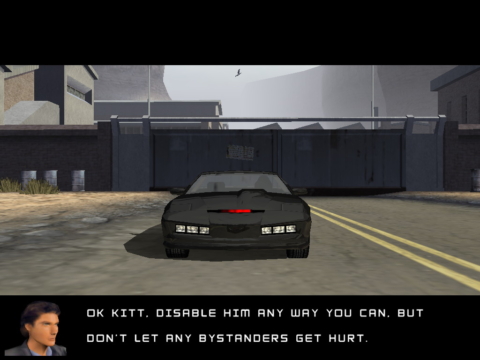
Knight Rider: The Game
Written by: Rik
Date posted: March 14, 2009
- Genre: Action
- Developed by: Davilex
- Published by: Davilex
- Year released: 2002
- Our score: 3
At some time in the 1980s, Ocean Software, at that point the kings of churning out licensed software, produced an execrable Knight Rider game for the 8-bit formats. Most people agreed it was terrible: my computer magazine of choice, Amstrad Action, gave the game a score of 19% and said some fairly rude things about it. Despite being generally trusting of magazine reviews (at least enough to avoid something that got a score in the teens), I nevertheless coveted the game – after all, it was Knight Rider – there’d probably be a beepy rendition of the theme tune, and most importantly, I’d get to play at driving the car. How could it possibly be that bad?
Unfortunately, I never got to find out, as my father (who at that stage was in charge of game-purchasing decisions owing to my tender years and lack of disposable income – or any income, for that matter) rightly pointed out that such a game was likely to be a complete waste of money. But if nothing else, the fact I even considered it says something about the astounding popularity of a TV show, which, to be fair, had a fairly preposterous concept as its basis. Looking back, it seems slightly odd that the story of a man and his talking car was ever popular among those old enough to vote, but for many kids of a certain generation, it was their maverick-vigilante series of choice.
Including mine (Airwolf, begone!) – which probably explains how I ended up with this game in my collection. Released some 15 years after the cancellation of the show, there seemed to be little incentive for the developer to put much effort in, and when that developer is Davilex, purveyors of low-quality road-racing games (“user-friendliness, brand recognition and affordability are the fundamentals of [our] mission statement”, proclaims their website) the chances of them doing so suddenly take a nose-dive. So, while my expectations were extremely low as I shamefacedly handed over £4.99 to a sniggering shop assistant in exchange for this game (this was embarrasingly close to the time of the game’s release, by the way – no “I’m buying this to review it” excuses here), I decided that I would proclaim myself satisfied providing that: 1) it featured the opening credits and theme song from the show; 2) there would be a point where KITT would demand you use “turbo boost” to jump over a moving object; and 3) the game wasn’t totally, completely, broken.
To which the answers are, respectively – yes (although the narrator has a Dutch accent), yes and, er, yes (just about). To be blunt, Knight Rider: The Game (hereafter referred to as Knight Rider) represents just about the bare minimum amount of effort a developer could possibly put into a game and get it out of the door on time without the end result being totally contemptuous. To be fair, the end product is probably what Davilex were aiming for, and anyone expecting anything better perhaps has to ask whether the license really is worth anything more.
My initial, and admittedly biased, response would be “yes”. Frankly, anyone purchasing this game is likely to have done so on the basis that they would finally get to drive the black Trans-Am with a silly flashing light on the front. Unfortunately, though, any childlike excitement at the prospect of doing so is soon dissipated by the game’s sluggish, lumpy handling, and the fact that your high-tech piece of machinery sounds like a broken vacuum cleaner. Most disappointingly, it doesn’t even look like the real thing, which you’d have thought would have been possible given how recent the game is. If I put my nerdiest of hats on I’d guess that the license probably didn’t allow the car to look too much like a real Pontiac, although even if this was the case they still could have made more effort with the model that’s been used.
As for the gameplay, the missions broadly fall into one of two categories. Firstly, there are sections where you have to chase a bad guy and keep him (or her) in range. Even though you’re in the fastest, most advanced car in the world, the vehicle you’re chasing normally manages to keep ahead of you most of the time, aided in no small part by the unexplained presence of landmines on the road, an almost constant sequence of random explosions, as well as the need to avoid falling debris and other obstacles. It’s extremely simplistic and undemanding stuff, although there are some moments of superficial satisfaction, such as when you’re suddenly confronted with a train coming through a level crossing ahead and the only way to avoid it is to hit “turbo boost” to send you flying through the air to safety. It’s almost like being in the TV show, and the game even switches to a different camera angle to show the jump in slow motion – causing ‘happy lights’ to switch on in your brain as the seven year-old version of yourself thanks you for buying the game.
The other major element of Knight Rider involves using KITT for exploration and reconnaissance – or in other words, driving around in enclosed spaces scanning buildings and crates for something or other. It sounds dull, and it is, but it’s also where the game descends into a fiddly, irritating farce. You see, driving around and scanning boxes isn’t all that difficult really, so to make things more challenging, the developers have decided to add a platform-jumping element to proceedings, placing certain buildings or objects over a wall, or above ground level, so that they’re difficult to get to. To do so, you have to use the old favourite, “turbo boost”, to jump onto crates and the tops of buildings. It’s a bit like Tomb Raider, really, except with a car.
Frankly, it’s ridiculous, and only serves to highlight the fact that at no point in the game does Michael Knight get out of the car: you’re always controlling KITT. Early on, you’re sent to investigate shady goings-on at a factory, with our permed hero suggesting we do some “sneaking around”. While the phrase “sneaking around” may be open to some interpretation, I’m pretty sure that the extremely conspicuous sight of a car bouncing around on the top of buildings doesn’t count. At the end of another level, where you have to get to a helicopter to stop it taking off, you reach a point where it would be perfectly logical for the virtual Hoff to get out of the car and climb a walkway to intercept the chopper, but instead you have to jump onto crates and rooftops in the car until KITT is literally parked right next to the damn thing.
In fairness, given the nature of the TV show, it’s hard to imagine exactly how a developer could make a whole game out of it. Sure, a typical episode of the show would involve KITT doing a fair bit of chasing and jumping, but there was also the bit at the start where Devon would tell Michael to go to a small town and visit a recently widowed and glamorous young woman whose husband had been killed while working for a shady corporation. It’s difficult to see how this could have been recreated effectively for the game, and to get around this Davilex seem to have decided just not to bother at all. As a result, there’s very little fighting for the innocent, the helpless or the powerless involved, with the action centring instead on some half-baked story featuring Michael Knight’s evil twin Garthe, and KITT’s prototype model, KARR (he’s kind of an evil twin too) teaming up to do something, er, bad.
It’s largely forgettable stuff, and it’s not helped by the method of delivery, which is a combination of in-engine cut-scenes and static text and pictures between missions. Yes, you read that right – I said static text and pictures, in the year 2002. It seems they couldn’t even be bothered to provide voice-overs for these bits. As for the in-engine scenes, none of the human characters are actually ever seen on-screen, instead the game camera just sort of stays where it is while some talking heads appear along the bottom of the frame. Hasslehoff fans expecting the man himself to make an appearance will be disappointed to learn that a Dutch soundalike has been employed instead (although he does a decent enough job), and in truth there’s not an awful lot of dialogue in the game.
Nostalgia aside, Knight Rider wasn’t a great TV show, and given the lack of respect shown by developers for more high-profile licenses, it’s hardly a surprise that Davilex haven’t pulled out all the stops to be completely faithful here. After all, it’s entirely likely that it would have sold the same number of copies to the same gullible morons (e.g. yours truly) regardless of its level of quality. However, a little bit more effort would have been nice. For example, the Knight Industries truck is always static, so there’s no opportunity to drive onto or off it while it’s moving like in the show (even Spy Hunter managed this).
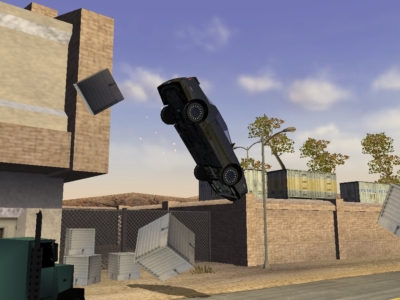
This never happened to Hasslehoff. Fortunately, though, all collisions in the game are completely consequence-free.
There’s also no banter between the main characters – Devon doesn’t scald Michael for being reckless, Bonnie isn’t constantly rebuffing Michael’s terrible chat-up lines, and there’s none of the extremely camp repartee between car and driver which always used to be a hallmark of the show. And while the original theme music is present and correct in the title sequence, during the game it’s been replaced by some terrible, nondescript Euro-house – although in fairness its depressingly repetitive nature does somehow fit the onscreen action.
Still, for one-time fans of the show, there are one or two moments to savour here, but no matter how happy pretending to jump over a fake ravine in a fake talking car while hunched in front of your PC will make you, there’s no masking the fact that this is an extremely basic and repetitive game, with very few concessions made towards being entertaining or faithful to the license. Although it is marginally better than Dukes of Hazzard: Racing for Home (of which we will never speak again).

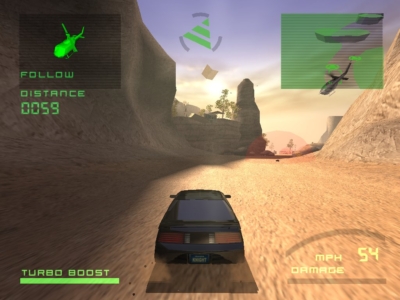
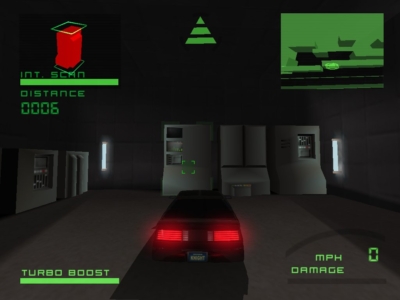
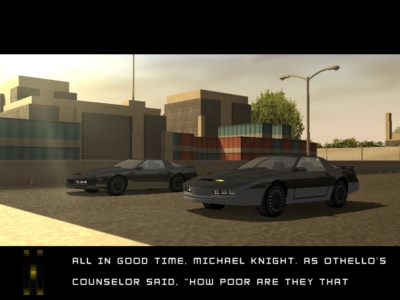

 Posts
Posts